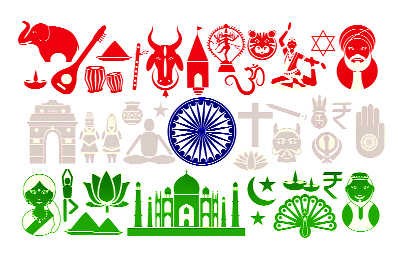
Let us rediscover India.
I am beginning to get more and more convinced that we do not appreciate our own treasures until someone else (preferably non-Indian) draws the attention of the world to it. Whether this pertains to our architectural and literary heritage or our spiritual past, the story is the same. We pooh-poohed and made fun of our ayurveda and Yunani medical tradition until the West adopted it enthusiastically as herbal medicine. The same goes for yoga and Sanskrit literature, so that today the most highly-regarded scholars and practitioners of these ‘arcane’ knowledge systems are non-Indians.
I was so ashamed of my own lack of Sanskrit when I met a Norwegian student recently who not only knew it, but was also working on medieval Jain manuscripts. There are many like him I run into from time to time who remind me afresh of how we never appreciated our own languages even as we loved it when praised for our fluency in English. When told I speak good Hindi, I wonder why they are surprised that I do: why wouldn’t I, I feel like retorting, it is my mother tongue!
Gandhi, too, falls somewhat in this category. We had almost forgotten the man who educated the world on ahimsa and non-violence and was its most passionate advocate after the Buddha. However, while the Dalai Lama, Martin Luther King Jr, Nelson Mandela and Aung San Suu Kyi made Gandhi the inspiration behind their own freedom movements, we had all but forgotten his teachings.
Two of Gandhi’s most inspiring mantras were ‘Cleanliness is next to godliness’ and ‘The earth has enough for man’s needs but not enough for his greed’. If only we had paid attention to the enormous moral universe that lay behind these simple truths, we could have reached where we struggle to find a place today: at the forefront of the world’s advanced communities. No Indian child who belonged to my generation was unaware of the value of thrift and austerity in everyday life. The India we grew up in during the Fifties and Sixties was a spare and spartan country compared to what we have now. Rare was the family that owned a car and even rarer the child who did not walk or cycle to school. Books and clothes were handed down from one child to another and skirts and trousers darned and made to last until you could no longer stuff yourself into one. Nothing, but nothing, was thrown away until the last ounce of utility had not been squeezed out, not because some families could not afford replacements but because we were taught to ‘waste not, want not’.
The neighbourhood cobbler (a rare sight in today’s urban landscape), the friendly Sardarji who mended everything from pressure cookers to faulty toasters and irons, the watch repairman who fixed clocks and watches, squinting through an eyepiece — where have they all disappeared? Perhaps there is no place for them anymore in an India where it is easier to replace than repair. Our first refrigerator lasted us almost 20 years and stoutly accompanied us from posting to posting. It made death-like sounds towards the end, but never died on us the way the posh number I have now does. This one is a delicate beauty that needs to run in a cool place and softly coughs and faints at the height of summer because the dear thing cannot stand the heat! It costs me an arm and a leg to replace faulty parts and I have been warned I should replace it soon, because its shelf life is over (at just six years!). Our old Ambassador car stayed with us for 22 years and when we finally sold it to a taxi driver, I swear it looked back at us and sobbed.
I still love my old mobile phone and my posh nieces who change their sleek phones every year have often offered to donate their old one to me as the one I use is now not even used by maids and drivers, they sniff. I am not a busy type, I tell them tartly, that I need to stay wired to my phone and track my company’s stock every nano-second. Nor do I like to take selfies and send useless twitter messages that just clog up air-waves and make no difference to anyone’s life. I am quite happy with my trusty old steed, thank you. I am sure they tell funny stories behind my back about a cussed old aunt who still hasn’t got a smart phone. Well, if they do then I want to say that they have hawked their brains to these gadgets and become more stupid: they can’t do mental sums and calculations as fast as me, nor remember important dates and assignments without a reminder that beeps a message to them. All they seem to do with these sleek phones is play games, tweet messages and spend all their life on the app-circles exchanging useless information.
I am no Luddite, but really, sometimes, I feel that a good dose of Gandhigiri would do us all well. So, before you throw away a broken mixie, try getting it repaired. Tell your child to waste less and you will have made your contribution to a better tomorrow.



























